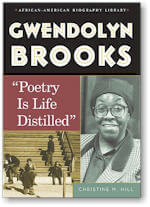Fine 1950’s Black Literature
 Life began to change for black people in America after World War II. Many decided to move north and escape the crushing racism of the south. In northern cities, work was available and the possibility of economic achievement became real. This geographic change, often termed the Great Migration, helped give birth to the Civil Rights movement and a new way of exploring life in 1950 black literature.
Life began to change for black people in America after World War II. Many decided to move north and escape the crushing racism of the south. In northern cities, work was available and the possibility of economic achievement became real. This geographic change, often termed the Great Migration, helped give birth to the Civil Rights movement and a new way of exploring life in 1950 black literature.
In 1949 African American books burst into common culture with the award of a Pulitzer Prize to Gwendolyn Brooks for her poetry. Playwrights, novelists, and poets of African descent all became major players in the literary field creating more awareness of the black experience in the United States, and support for the burgeoning call for freedom and equality.
Exploring these writings is like taking a small step back in time. It can help focus on the progress that's been made, both in literary standing and in racial equality, while driving one's spirit to continue the quest.
Other topics:
- African American Children’s Books
- African American Books
- African American Poems
- African American Christian Books
Varied African American Books
There is not one face to Black literature. From stirring poetry to memoirs to novels, artistic expression among African American authors is as varied as the black experience itself. This leads to a rich treasure trove of possibilities in African American books. From slave narratives to coming of age novels, from poetry to essays, fine black authors abound.
1950 black literature is in many ways particularly compelling. Like a young man just coming into adulthood, much of the writing of this period of time explores issues of identity, entitlement and growth in ways that are as meaningful today as they were when first written.
The Black American experience is in some ways a common human experience. Overcoming other's perceptions of one's limitations, taking ownership of one's potential, and truly learning to shine has meaning for us all no matter the color of our skin.